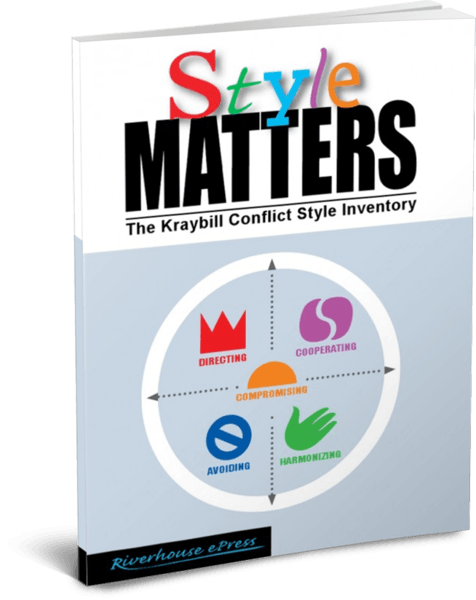

About Style Matters Conflict Style Inventory
When someone takes the Style Matters: The Kraybill Conflict Style Inventory they answer 20 questions about their responses to conflict. The exercise takes about 10 minutes. Users then receive scores showing their typical responses in conflict and a set of suggestions for optimizing their responses.
Style Matters is available in two forms. The 24 page paper version is self-tallied and designed for use in a standard face-to-face training setting. The online version is similar to the paper version but goes much farther in interpretation. A complex algorithm creates a 10 page score report based on a user's unique scores, providing many specific suggestions for the user.
The depth of the score report of the online version allows for individuals to do entirely self-directed learning. Many trainers use the online version even when they are doing an in-person workshop. That way users get indepth individualized feedback from their score report and group conversation in the workshop.
Detailed trainers guides are available free to trainers and make it easy for anyone with basic group facilitation skills to lead a successful learning experience.
Style Matters is psychometrically valid and culturally flexible, and designed for solo use or in a trainer-led workshop. See side-by-side guide to formats here.
Style Matters scores users on five styles of conflict - Directing, Avoiding, Harmonizing, Cooperating, and Compromising - indicating which conflict styles they prefer most and least. Several pages are devoted to each style, outlining its strengths and caution points, and giving tips for working with people who favor this style. Style Matters scores users in settings of both Calm and Storm Shift, and for some users this reflects a significant change in behavior as conflict becomes more intense.
How does Style Matters achieve cultural adaptability?
The Style Matters inventory gives users a choice of two different set of instructions while taking the instrument, one appropriate to low-context cultures and one to high-context cultures. More info on this unique feature here.
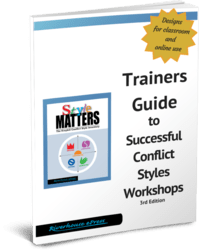
Conflict Styles Resources for Trainers
Riverhouse ePress publishes a free "Trainer's Guide to Successful Conflict Styles Workshops" by Ron Kraybill. This is a concise, step-by-step, 40 page guide designed to support anyone with basic group leadership skills to lead a workshop on conflict styles. Download on the Training Products Page of Riverhouse ePress.
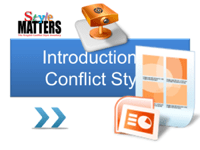
Riverhouse maintains free online access to "Intro to Conflict Styles", a 10 slide Powerpoint presentation that gives a quick over of the basic logic underlying conflict styles. Users can view it on their own or trainers can use it as an early foundation of a teambuilding, conflict resolution or mediation skills workshop.
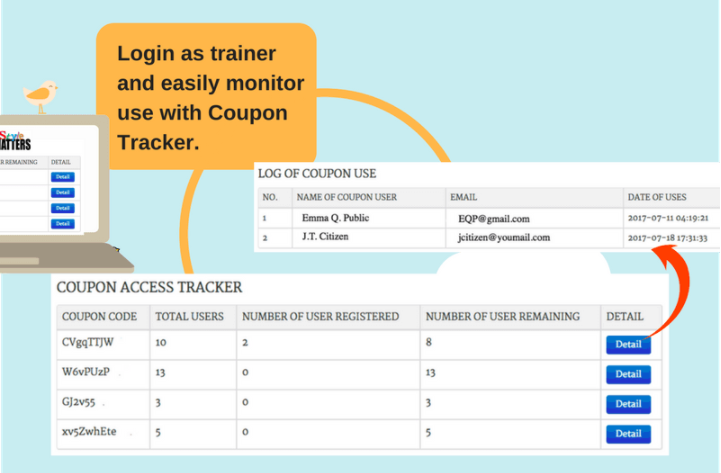
Access Code for quick login. Trainers who pre-pay for their users can request an Access Code and send their users to a quick login visible on lower left on the front page of our site. Users simply register their name and email and enter the code, and are then transferred directly to the inventory.

Dashboard for powerful user management tools.
Trainers who want to monitor which users have taken the inventory or delay delivery of conflict style Score Reports until a time of the trainer's choice can use the optional Trainer's Dashboard at modest additional cost. The Dashboard contains a suite of user management tools on one webpage, including registering and inviting users, viewing and printing score reports, emailing score reports, sending followup instructions notes with one click, or aggregating conflict style scores of a whole group.
Who uses the Style Matters conflict style quiz?
Thousands of students in leading colleges, university, and professional schools every year as part of academic courses.
Partners in families and businesses take it separately and then discuss the results together.
Teams take it and discuss results together as a positive, practical teambuilding exercise.
Managers and project leaders learn how to bring the best out of each team member.
Human resources professionals help staff members, departments and teams develop better conflict resolution skills and create a better working atmosphere.
Professors in dozens of universities and colleges use it to introduce conflict management skills to students. These include medical and nursing school professors who use it to train doctors and nurses for conflict management in medical settings, business school professors who train students in MBA programs, law school professors, and leading peace studies programs.
OD specialists, consultants, and coaches use it to work with individuals and teams.
Mediators and negotiators improve their effectiveness in conflict resolution, and use it to train people entering talks.
Trainers in conflict resolution or leadership skills structure training sessions ranging from one hour to half a day around it.
Pastors and other religious leaders strengthen their skills in congregational conflicts and include Style Matters in leadership training.
Call center staff use it in training for dealing with difficult clients.
Service staff in several large US state and federal agencies use it in training for interacting with populations they serve.
A large multi-national corporation administers it to staff in six countries as a routine skill for communication.
Military trainers administer it to units across an entire national defense force.
Development workers in numerous countries use it to train organizational staff and community workers.
What are the time requirements?
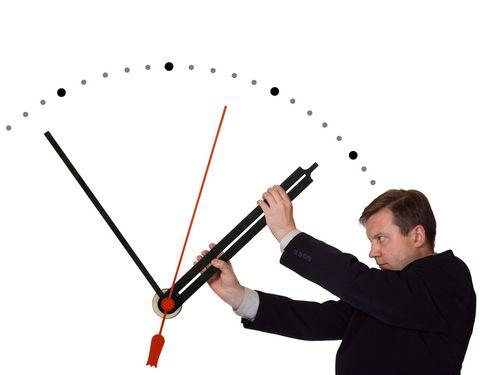
While taking the conflict style inventory, most users answer the twenty questions in about ten minutes. With the Online version, scores are tallied automatically and a report with recommendations based on scores is issued immediately. With the print and PDF versions, users tally scores by hand with instructions in the inventory, which takes 3-5 minutes.
Reflection about conflict styles is, of course, the point of the exercise. An individual can do this solo, working through the key parts of the Online tutorial in half an hour or less. These include access to our "Intro to Conflict Styles" visual presentation. However, conflict is a social experience - learning about it is more effective as a social experience.
A trainer can present the basics in a workshop in as little as 30 minutes. For best results, plan for 1-2 hours of interpretation and discussion time. The print and PDF versions contain two pages of suggested discussion questions, so you can easily tailor discussion according to the time available. You can fruitfully spend up to a day of learning and discussion around this inventory.
The free Trainers Guide to Successful Conflict Styles Workshops is keyed to Style Matters and makes it easy for anyone with group facilitation skills to lead a conflict styles workshops. Download it now!
Comparison to Thomas Kilmann and other conflict style quizzes
Style Matters is an easy-to-use, all-purpose learning tool about conflict resolution. It is research validated and the subject of several current studies. Since several other instruments already address certain specialized uses, it is designed to be the instrument of choice for learning and teaching about conflict resolution and relationship management in general. After more than five years, we don't know of a single trainer who went back to their old inventory for general teaching purposes after trying Style Matters! But for certain purposes, other inventories may be preferable.
Comparison to The Thomas Kilmann Conflict Mode Instrument. Style Matters is similar in its core logic to the Thomas Kilmann Conflict Mode Instrument, a conflict styles inventory created in the 1970s, as both are based on the Mouton Blake Axis. A large number of former TKI trainers now use Style Matters and find the switch an easy one.
Click here for detailed comparison of Style Matters and Thomas Kilmann!
Unique benefits of Style Matters
- Designed for users of diverse cultural backgrounds. Provides different instructions for users from individualistic and collectivist cultures.
- Scores users for their Storm Shift, a change in conflict style that many people experience when conflict escalates.
- Unique Trainer Dashboard provides powerful tools for easy administration and monitoring use of Style Matters in classroom and group settings.
- Unparalleled trainer-friendliness, combining all elements for administering and interpreting a conflict style inventory in one low-cost package.
- ExFinally, no other conflict style inventory on the market approaches the convenience and power of the Style Matters Trainer's Dashboard, providing trainers with powerful tools for easily administering and monitoring use of Style Matters in classroom and group settings.
A strength of the Thomas Kilmann for certain purposes is that over several decades of existence, it has been the subject of multiple research studies. Style Matters too has been and continues to be the subject of research, but as a more recent arrival has a shorter research record.
Intercultural Conflict Style Inventory. Unlike the Intercultural Conflict Style Inventory by Mitch Hammer, Style Matters is not a full-blown cultural comparison instrument. The ICS is designed to facilitate awareness of ways that differing cultures deal with conflict, whereas Style Matters is a tool for learning and teaching conflict resolution. While Style Matters works in both individualist and collectivist cultures, if the purpose is primarily cultural awareness, the ICS may be the instrument of choice.
Guarantee
We are so confident you will like Style Matters: The Kraybill Conflict Style Inventory that we'll cheerfully return your money if you are disappointed. (If you purchased physical products, you must of course return booklets in good shape and we will not refund shipping costs.)
If you use our inventory in a training workshop and do not agree that it is more effective than any other conflict style inventory you have used as a teaching tool, keep the booklets you've already used and we will refund 50% of their purchase price (less shipping). We will also refund 100% of any booklets you return in good shape and 100% of any user rights to the Online Version or Rights to Reproduce you purchased.
Although we have offered this guarantee on our site for more than 5 years, as of early 2013, we have yet to get a single request to honor it!
Place an Order
Individual users, go here. Trainers, buy for groups and get support materials here or to our frontpage at www.RiverhouseEpress.com. Payment is by Paypal, credit card, bank transfer, or with prior approval for recognized institutions, by check. All credit card purchases are processed for us by Paypal but it is not necessary for you to have a Paypal account in order to use your credit card. After you have placed your order in the shopping cart, you will be transferred to a Paypal page where you can fill in credit card info.
For help with ordering, please send us a note at: This email address is being protected from spambots. You need JavaScript enabled to view it. We will get back to you within 24 hours.
Is this conflict style quiz research validated?
Yes, twice! A 2005 doctoral study using Style Matters conflict style inventory found that the instrument performed well in reliability testing and is “valid and reliable”. Jean Chronis Kuhn, who received her Doctorate in Nursing Practice at Rocky Mountain University of Health Professions, administered Style Matters to Massachusetts nursing home directors to assess conflict management styles before and after a conflict management teaching intervention. In her conclusion, Chronis Kuhn wrote that inventory performed well in reliability testing, "leading to the conclusion that the model and conflict measurement tools have immense applicability to other nursing settings as well as sustainability.”
A larger research project conducted by researchers in the Communications Department at West Chester University of Pennsylvania in 2009-2010 administered Style Matters to more than 300 subjects and tested various wordings of questions for validity and reliability, standard benchmarks of consistency and accuracy of measurement in testing. Adjustments were then made to reflect these findings. Based on the results of their research, the researchers rated Style Matters well on both counts, and reported their findings in a peer-reviewed essay by M.E. Braz, B. Lawton, R. Kraybill, & K. Daly, K., "Validation of the Kraybill Conflict Style Inventory," submitted to the 2010 Annual Convention of the National Communication Association, San Fransisco, CA. A related essay by Mary Braz and Bessie Lawton, "Kraybill Conflict Style Inventory Validation" was published in the Humanities and Science University Journal, 2, 2012, pages 9-24.
Riverhouse ePress actively supports objective scholarly research into conflict styles by providing access to Style Matters at no cost to serious academic research projects, while maintaining a policy of complete objectivity regarding findings.
Our Story - How Style Matters Developed
Early Draft - 1980s
Style Matters developed because a conflict resolution trainer had learned from personal experience how effective a conflict style inventory can be as a training tool. Dr. Ron Kraybill was an early pioneer in conflict resolution in the 1980s, leading conflict resolution workshops in a wide variety of settings in the US, Canada, and Europe for Mennonite Central Committee, an early pioneer in the field of conflict resolution in the US, Canada, and abroad. He used the Thomas Kilmann Conflict Mode Instrument for several years and experienced its effectiveness as a tool for introducing core concepts of conflict resolution.
But he often encountered complaints about the "forced choice" format of that inventory. When groups included people from diverse cultural backgrounds, he heard complaints that the inventory "didn't fit" the context of some people. And working primarily with community, educational, and religious groups, the high per copy cost for purchasing the inventory was prohibitive. He began experimenting with the development of an alternative version, also based, like the Thomas Kilmann, on the five-styles Mouton Blake Grid, but with different wording and offering a spectrum of choices in answering.
In the mid-1980s, Kraybill was introduced by Dr. Barbara Date to the Gilmore-Fraleigh personality-type inventory and used it for several years. He was particularly impressed with two aspects of this instrument. One is a feature that recognizes the impact of stress and anxiety on behavior by having users answer some questions about calm settings and some about settings where people are frustrated. Though it is not a conflict style inventory, this feature of the Gilmore-Fraleigh proved to be highly relevant to situations of conflict.
A second feature of the Gilmore Fraleigh that impressed Kraybill was its "Hot Tips", which provide users with specific suggestions for helping others to function at their best, based on their styles. In workshop and practitioner settings, Kraybill saw that users were highly responsive to these practical suggestions for supporting best functioning in others. And in organizational settings, when presented and discussed in a group, this feature helped shift from negativity to a climate of positive, mutual support. He incorporated a Calm/Storm differential into his own experimental inventory.
Carried abroad by trainers in the global network of Mennonite peace and development workers, the Kraybill inventory circulated informally for many years, its reputation spread by word of mouth. It is still used in its early form by some trainers, though often not identified as the Kraybill Conflict Style Inventory.
Major Upgrade - 2004
Recognizing the widespread use of the KCSI that had developed completely unattended, in 2004, Kraybill revised it, incorporating ideas and comments accumulated from trainers and users over a period of years. In 2005 the upgraded version was published by Riverhouse ePress, as Style Matters: The Kraybill Conflict Style Inventory.
The updated version added a component of cultural sensitivity, differentiating between users from collectivist and individualist cultures, and providing different instructions for each. It also added a lengthy section of tips for bringing out the best in each style, expanded interpretive guidance, and a discussion guide with questions for group reflection.
Psychometric Validation - 2008
At a conflict resolution conference in 2006, a peace studies professor with special interest in psychometrics challenged Kraybill in a friendly hall conversation to standardize the instrument. You really shouldn't be administering an instrument that is scoring people, he said, if you haven't put it through recognized procedures for standardization. Although Kraybill had devised and circulated the inventory for conflict resoution training purposes, not for personality measurement, he recognized the wisdom of the argument.
In 2008, Kraybill was approached by Bessie Lawton and Mary Braz, faculty in the Communications Department at West Chester University of Pennsylvania, West Chester, Pennsylvania, with an offer to perform standardization research. Over an 18 month period, they administered the conflict style inventory to 300 students, testing various wordings of questions to achieve psychometric validation. These findings were incorporated into the inventory in 2009. (See section on page above.)
Online Version - 2009
With useage by conflict resolution trainers in many settings increasing rapidly, the need for an Online Version became apparent. In 2009 Kraybill developed the Online Version, which adds features to the paper and PDF versions, in particular an interactive tutorial enabling solo use. In 2010-11, he added a Trainer Dashboard based on extended feedback from many trainers, enabling easy management of users from one online location, including a facility to deliver the Score Report to users at a time of the trainers choice rather than at time of taking the inventory.
Commitment to Accessible Pricing
Riverhouse ePress retains the commitment of its founder, Dr. Ron Kraybill, to making Style Matters available at affordable cost to all who wish to use it. We do our best to remove cost as a major hindrance to using Style Matters by any group committed to building a more peaceful world and we invite proposals when this is the case. Please include the name and location of your organization, when and how you plan to use the inventory, estimated number of users, and the reason you are requesting special pricing consideration.
Support for Research
Riverhouse supports academic research and has a policy of providing free rights of use to students doing bona fide research. Requests must be submitted in writing (email) and indicate:
- Name of student, institution, and supervising professor;
- A description of the research, including the research questions, the number of users for whom permission to use Style Matters is sought, and the time frame within which the inventory will be administered;
Riverhouse will review this request and reply. If permission is granted, Riverhouse requires the researcher to make a $50 deposit via Paypal or other means of transferring funds in order to gain final authorization. We impose this reluctantly because we are eager to learn from research, and have learned that, all good intentions notwithstanding, only if there is money on deposit do we hear again from most students after they secure our permission. We will immediately refund the money upon receipt of the final research paper, or a summary thereof, or a notice that the research project was abandoned. All research findings remain the property of the researcher and we will not release them without permission of the researcher.
Resources on Conflict Styles
There is a good general introduction at this Wikipedia page on conflict style inventories. On the Riverhouse site we maintain a directory of resources and topics related to conflict styles.



 Need assistance? Email center@riverhouseepress.com with a copy of the login instructions you received and a brief description of what is happening. We'll reply in one business day-usually less.
Need assistance? Email center@riverhouseepress.com with a copy of the login instructions you received and a brief description of what is happening. We'll reply in one business day-usually less.